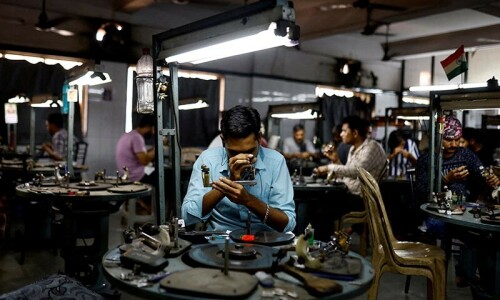
Pakistan’s ceramic tile industry continues to struggle in the face of rising energy prices, high tax rates, extremely low Import Trade Price (ITP) of imported tiles from China and elsewhere, and increased inflow of smuggled tiles from Iran.
The low ITP values and unchecked smuggling have helped the foreign porcelain and ceramic tile producers to capture over 40 per cent of the country’s tile market of nearly 80 million square meters as domestic manufacturers continue to bleed owing to their higher production costs and uneven competition from cheaper imported products. Almost 60pc of the market is concentrated in Punjab. Sindh and Khyber Pakhtunkhwa make up for the rest of the tile sales.
Over 28pc of the market is taken over by imported tiles, mainly from China. European and other producers have only a fraction of the market, which is estimated to be below one per cent. Smuggled Iranian ceramic tiles constitute a little more than 13pc of the market. The rest of the market is shared by six local producers — Master, Shabbir, Karam, Sonex, Swat and Forte — that employ 50,000 people, of which 80pc to 85pc are unskilled workers.
The industry can contribute to the national exchequer if steps are taken to prevent dumping into the market
Almost every local tile manufacturer has up to 30pc idle capacity owing to an influx of imported tiles because of smuggling, dumping and low quality. Though the imposition of anti-dumping duty in October 2017, in the range of 9.3pc to 36.3pc, and increase in regulatory duty (RD) from 25pc to 45pc have helped the domestic industry, they have failed to slow down the influx of Chinese tiles into Pakistan since they remain cheaper than the local products due to their low ITP values.
The influx of imported tiles, mostly of poor quality and design, means a loss of almost 35,000 jobs and tax revenue worth billions of rupees. Additionally the country is losing a substantial amount of foreign exchange, which is already in short supply these days.
“The government can generate revenue to the tune of billions of rupees and create thousands of jobs if the domestic industry is rid of unfair competition from importers and given an even playing field,” Masood Jaffery, the chief executive officer (CEO) of Shabbir Tiles, told this correspondent during a conversation last week.
Shabbir Tiles, one of the two tile manufacturers listed on the stock exchange, has recently come out of the red and earned a pre-tax profit of Rs203.6 million in the first three quarters ending on March 31 of the last reporting year after years of losses. It had suffered a loss of Rs122.7m during the same period last year.
The firm, the second largest tile manufacturer after Master, has increased its production capacity to one million square meters a month but is producing around 700,000 square meters at present.
The other listed tile company, Karam Ceramics, on the other hand, which ran up a loss of Rs58.7m in the first half of the last reporting year, was able to turn around its fortunes in the third quarter with a profit of Rs11.7m.
With the revival of the flagging economy being one of the top challenges for the new PTI government, Masood says his industry could also contribute to the national exchequer if its energy costs are reduced and steps are taken to prevent dumping of Chinese and Iranian products into the market. “This sector has a massive untapped potential and can grow exponentially, create jobs, ensure technological transfer and contribute to the gross domestic product (GDP) and even exports,” he argues.
He expects the tile market size to grow by over 10pc as the construction sector booms on the back of rapid urbanisation, huge housing backlog, and construction of large malls, office buildings and apartments across the country.
“The industry is willing to invest in capacity enhancement, to further increase its production in order to meet demand, provided that the government supports the industry. Import should be allowed only if the local manufacturers are unable to meet demand. Unfair competition and higher production costs forced one local firm to close down its operations a few years ago.”
Being the only company in Pakistan that is certified by Centro Ceramico on ISO/European Standards, Shabbir Tiles has recently invested Rs1.25 billion in machinery upgrade, capacity enhancement and quality improvement.
The company claims it could compete with European tiles in quality. “A fair market will not only induce existing companies to invest in capacity and quality but also attract fresh investment in this industry as market size grows over the next several years,” Masood argues.
What will we make if we cannot make tiles in the country?
Published in Dawn, The Business and Finance Weekly, September 10th, 2018













































